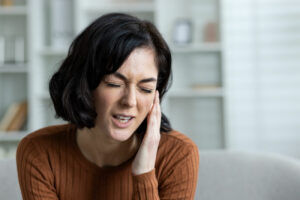Understanding the Link Between TMJ Disorders and Chronic Headaches
TMJ disorders can significantly impact your quality of life, often leading to chronic pain and discomfort. One of the most common and debilitating symptoms associated with TMJ disorders is headaches. Understanding the connection between TMJ and headaches can help you seek appropriate treatment and find relief.
What is TMJ?
The temporomandibular joint (TMJ) is the hinge that connects your jaw to your skull. It allows you to move your jaw up and down and side to side, enabling you to talk, chew, and yawn. TMJ disorders occur when there are problems with the muscles and joints in the jaw. These disorders can be caused by various factors, including injury, arthritis, genetics, or grinding of the teeth.
How TMJ Disorders Cause Headaches
TMJ disorders can lead to headaches in several ways:
- Muscle Tension: The muscles around the TMJ can become tense and strained, leading to tension headaches. These headaches often start at the base of the skull and can radiate to the forehead and temples.
- Nerve Pain: The TMJ is located near several nerves, including the trigeminal nerve, which is responsible for sensation in the face. Inflammation or irritation of the TMJ can affect these nerves, leading to pain that radiates to the head and face.
- Misaligned Jaw: A misaligned jaw can cause an imbalance in the way your teeth fit together, leading to additional strain on the TMJ and surrounding muscles. This strain can trigger headaches.
- Referred Pain: Pain from the TMJ can be referred to other areas of the head and neck. This means that the discomfort originating in the jaw joint can manifest as a headache.
Symptoms to Watch For
If you suspect that your headaches may be related to a TMJ disorder, look for these accompanying symptoms:
- Jaw pain or tenderness
- Clicking or popping sounds when opening or closing the mouth
- Difficulty chewing or pain while chewing
- Limited range of motion in the jaw
- Earaches or ringing in the ears (tinnitus)
Treatment Options
Treating TMJ-related headaches often involves addressing the underlying TMJ disorder. Here are some treatment options that can help:
- Medications: Over-the-counter pain relievers and anti-inflammatory medications can help reduce pain and inflammation. In some cases, muscle relaxants or prescription medications may be necessary.
- Physical Therapy: Physical therapy exercises can strengthen the muscles around the TMJ and improve jaw mobility. Techniques such as ultrasound, heat, and ice therapy can also provide relief.
- Dental Treatments: Correcting bite misalignment with orthodontic treatments or using dental splints can reduce strain on the TMJ. Mouthguards can also help prevent teeth grinding, a common cause of TMJ disorders.
- Lifestyle Changes: Reducing stress, avoiding hard or chewy foods, and practicing good posture can help alleviate TMJ symptoms and prevent headaches.
- Surgery: In severe cases, surgical interventions may be necessary to repair or replace the TMJ. This is usually considered a last resort when other treatments have failed.
Seeking Professional Help
If you are experiencing chronic headaches and suspect they may be related to a TMJ disorder, it is essential to seek professional help. A TMJ specialist can diagnose the condition and recommend a personalized treatment plan to address your specific symptoms.
Conclusion
Understanding the connection between TMJ and headaches can help you take the necessary steps to find relief. By addressing the underlying TMJ disorder, you can reduce or eliminate headaches and improve your overall quality of life. If you suspect that TMJ is the cause of your headaches, consult with a specialist to explore your treatment options and start your journey toward pain-free living.
Our clinic follows standardized protocols developed by TMJ & Sleep Therapy Centre International, a worldwide network focused on TMJ disorders, facial pain, and sleep-related breathing issues. Providers within this network often complete the intensive Mini Residency in TMJ & Sleep Therapy, reflecting a strong commitment to advanced, ongoing education.
